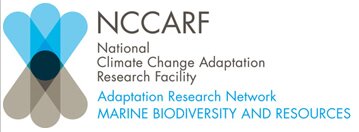|
Climate Change Adaptation
 Given the recent predictions by the Intergovernmental Panel on Climate Change (IPCC) indicating that global warming will affect the planet over at least the next couple of centuries, it is clear that new paradigms, policies, and governance systems will be essential for Australia in order to sustain the capacity of its marine ecosystems and for securing future economic and societal development. Unfortunately, the degree of resilience and adaptive capacity of many marine species to climate change risks and potential impacts, for example corals and coral reefs, are still poorly known. Given the recent predictions by the Intergovernmental Panel on Climate Change (IPCC) indicating that global warming will affect the planet over at least the next couple of centuries, it is clear that new paradigms, policies, and governance systems will be essential for Australia in order to sustain the capacity of its marine ecosystems and for securing future economic and societal development. Unfortunately, the degree of resilience and adaptive capacity of many marine species to climate change risks and potential impacts, for example corals and coral reefs, are still poorly known.
< Back
Adaptation?
 Adaptability is the ability to monitor, assess, respond, recover, and renew following known and unknown disturbances and other change (Resilience Alliance 2007). Adaptability is the ability to monitor, assess, respond, recover, and renew following known and unknown disturbances and other change (Resilience Alliance 2007).
Adaptation is adjustment in natural or human systems in response to actual or expected climatic stimuli or their effects, which moderates harm or exploits beneficial opportunities (Parry et al. 2007, 869).
Adaptive capacity is the property of a system to adjust its characteristics or behaviour, in order to expand its coping range under existing climate variability, or future climate conditions.
Response capacity is the ability to manage both the causes and the consequences of climate change (that is, to mitigate greenhouse emissions and adapt to climate change and variability) (Tompkins & Adger 2005).
Resilience Alliance. (2007). Assessing and Managing Resilience in Social-ecological Systems: A Practitioners Workbook (Version 1.0), available http://wiki.resalliance.org/index.php/Main_Page .
Parry, M. L., Canziani, O. F., Palutikof, J. P., van der Linden, P. J., & Hanson, C. E. (Eds.). (2007). Climate Change 2007: Impacts, Adaptation and Vulnerability. Contribution of Working Group II to the Fourth Assessment
Report of the Intergovernmental Panel on Climate Change. Cambridge, UK: Cambridge University Press.
Tompkins, E. L., & Adger, W. N. (2005). Defining response capacity to enhance climate change policy. Environmental Science & Policy 8, 562–571. < Back
Glossary of Terms
Climate change in IPCC usage refers to any change in climate over time, whether due to natural variability or as a result of human activity. The usage differs from that in the Framework Convention on Climate Change, where climate change refers to a change of climate that is attributed directly or indirectly to human activity that alters the composition of the global atmosphere and that is in addition to natural climate variability observed over comparable time periods.
Adaptation is the adjustment in natural or human systems in response to actual or expected climatic stimuli or their effects, which moderates harm or exploits beneficial opportunities.
Resilience is defined as the ability of a social or ecological system to absorb disturbances while retaining the same basic structure and ways of functioning, the capacity for self-organisation, and the capacity to adapt naturally to stress and change.
Vulnerability is the degree to which a system is susceptible to, and unable to cope with, adverse effects of climate change, including climate variability and extremes. Vulnerability is a function of the character, magnitude and rate of climate change and the variation to which a system is exposed, its sensitivity and its adaptive capacity.
Parry, M.L., O.F. Canziani, J.P. Palutikof and Co-authors 2007: Technical Summary. Climate Change 2007: Impacts, Adaptation and Vulnerability. Contribution of Working Group II to the Fourth Assessment Report of the Intergovernmental Panel on Climate Change, M.L. Parry, O.F. Canziani, J.P. Palutikof, P.J. van der Linden and C.E. Hanson, Eds., Cambridge University Press, Cambridge, UK, 23-78. < Back
Key scientific developments since the IPCC fourth Assessment report

June 2009
The Intergovernmental Panel on Climate Change (IPCC) released its Fourth Assessment Report (AR4) in 2007. Since then, a number of new scientific results have been published that expand our understanding of climate science. Some of the key findings since the last IPCC assessment are provided in this brief.
Key Points from the Brief
1. The link between fossil fuel emissions and many aspects of climate change is increasingly clear
2. Ocean acidification severely threatens marine ecosystems and fisheries
3. A better understanding of the behavior of large ice sheets combined with observations of rapid melting have raised
projections of 21st-century global sea level rise.
4. Surface melting of the Greenland Ice Sheet is accelerating.
5. Antarctic ice shelves are collapsing more rapidly than expected
6. Improved analysis suggests that Antarctica is warming.
7. Arctic sea ice is melting more quickly than projected.
8. Permafrost is thawing more quickly than previously thought.
9. The impacts of climate change may persist for more than 1000 years, even after human-induced emissions of CO2
stop completely.
10. Unmitigated CO2 emissions will likely generate greater warming than previously estimated
Summary. The majority of the new scientific insights described in the brief are based entirely or partially on direct observations of climate change. Sea level is rising, global ice cover is diminishing, and biological systems are responding to climate change. In general, observed climate change is proceeding at a more rapid pace than anticipated by previous estimates or model projections. Recent revisions of projected changes are higher than earlier estimates and the IPCC projections published in 2007 now appear rather conservative in light of more recent observations and improved modeling techniques. Fortunately, strong policies to reduce greenhouse gas emissions can still avert the worst consequences of climate change. < Back
Key Messages from the International Scientific Congress on Climate Change: Global Risks, Challenges & Decisions
 Copenhagen, Denmark 10-12 March 2009 Copenhagen, Denmark 10-12 March 2009
The University of Copenhagen recently hosted the International Scientific Congress on Climate Change under the heading “Climate Change: Global Risks, Challenges and Decisions” on 10-12 March 2009.
The main aim of the congress was to provide a synthesis of existing and emerging scientific knowledge necessary in order to make intelligent societal decisions concerning application of mitigation and adaptation strategies in response to climate change. For more information see:A SUMMIT OF SCIENCE FOR POLITICS”.
The congress aimed to identify and synthesise the science, technology and policy advances required in order to ensure sustainability of global communities in the current and coming decades. The findings of the congress should be seen as a supplementary to the work of the Intergovernmental Panel on Climate Change (IPCC). The six preliminary key messages were delivered by the Congress’ Scientific Writing Team resulting from the International Scientific Congress on Climate Change.
The conclusions will be published into a full synthesis report by June 2009.
The Danish Government will host the UN Climate Change Conference in December 2009 and will hand over the conclusions to the decision makers ahead of the Conference. For further information about the International Scientific Congress on Climate Change, please visit their website.
Key Message 1 - Climatic Trends
Recent observations confirm that, given high rates of observed emissions, the worst-case IPCC scenario trajectories (or even worse) are being realised. For many key parameters, the climate system is already moving beyond the patterns of natural variability within which our society and economy have developed and thrived. These parameters include global mean surface temperature, sea-level rise, ocean and ice sheet dynamics, ocean acidification, and extreme climatic events. There is a significant risk that many of the trends will accelerate, leading to an increasing risk of abrupt or irreversible climatic shifts.
Key Message 2 - Social disruption
The research community is providing much more information to support discussions on “dangerous climate change”. Recent observations show that societies are highly vulnerable to even modest levels of climate change, with poor nations and communities particularly at risk. Temperature rises above 2C will be very difficult for contemporary societies to cope with, and will increase the level of climate disruption through the rest of the century.
Key Message 3 - Long-Term Strategy
Rapid, sustained, and effective mitigation based on coordinated global and regional action is required to avoid “dangerous climate change” regardless of how it is defined. Weaker targets for 2020 increase the risk of crossing tipping points and make the task of meeting 2050 targets more difficult. Delay in initiating effective mitigation actions increases significantly the long-term social and economic costs of both adaptation and mitigation.
Key Message 4 - Equity Dimensions
Climate change is having, and will have, strongly differential effects on people within and between countries and regions, on this generation and future generations, and on human societies and the natural world. An effective, well-funded adaptation safety net is required for those people least capable of coping with climate change impacts, and a common but differentiated mitigation strategy is needed to protect the poor and most vulnerable.
Key Message 5 - Inaction is Inexcusable
There is no excuse for inaction. We already have many tools and approaches - economic, technological, behavioural, management - to deal effectively with the climate change challenge. But they must be vigorously and widely implemented to achieve the societal transformation required to decarbonise economies. A wide range of benefits will flow from a concerted effort to alter our energy economy now, including sustainable energy job growth, reductions in the health and economic costs of climate change, and the restoration of ecosystems and revitalisation of ecosystem services.
Key Message 6 - Meeting the Challenge
To achieve the societal transformation required to meet the climate change challenge, we must overcome a number of significant constraints and seize critical opportunities. These include reducing inertia in social and economic systems; building on a growing public desire for governments to act on climate change; removing implicit and explicit subsidies; reducing the influence of vested interests that increase emissions and reduce resilience; enabling the shifts from ineffective governance and weak institutions to innovative leadership in government, the private sector and civil society; and engaging society in the transition to norms and practices that foster sustainability.
< Back
|
